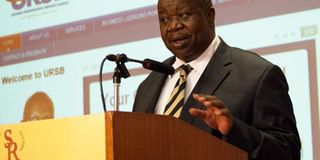Government replaces census with digital registration

Justice and Constitutional Affairs Minister Kahinda Otafiire at the Pan African study tour on civil registration yesterday. He said the new system will succeed. COURTESY PHOTO
What you need to know:
Embracing change. The government says the move is aimed at saving resources and having a reliable up-to-date databank.
Kampala
The government has said it might replace the periodical national population census with the Mobile Vital Records System, which will enable daily registration of births and deaths across the country.
The development was announced yesterday by the Minister of Justice and Constitutional Affairs, Maj Gen Kahinda Otafiire, who argued that a census must be conducted daily rather than once in a decade - as is the case for Uganda.
Citing Britain and other developed countries as success stories but do not carry out periodical censuses, Maj Gen Otafiire exuded confidence that the project would succeed.He added that with the new system in place, the government may conduct the census with much of the population’s records in store, and projects such as provision of national identity cards will eventually be successful. “The national databank shall be regularly updated, and shall equally cater for marriage registrations.”
The Mobile Vital Records was rolled out early this year, and according to the Uganda Registrations Service Bureau (URSB), the project implementer, it is a pioneer scheme in Africa.
The system uses internet connected gadgets such as computers, ipads and mobile phones, and shall be employed in all hospitals (private and public), local government offices. It will include a public-private partnership, which will bring on board telecommunication companies and development agencies such as UNICEF and UNECA.
A technology and innovation support centre has also been established at Uganda Industrial Research Institute to host the databank, which will ease the search for patents and records.
Mr Isaac Musumba, the URSB board chairperson, assured representatives of 11 countries world over and development partners who are in Uganda for a four-day symposium on civil registrations, to borrow the project’s practices. “The Ugandan government spends less on this project than it does on census, which is why we need to educate the country further on its advantages,” Mr Musumba said.
Mr Bemanya Twebaze, the URSB registrar general, said there was no fixed price tag to the project since several partners were involved.




